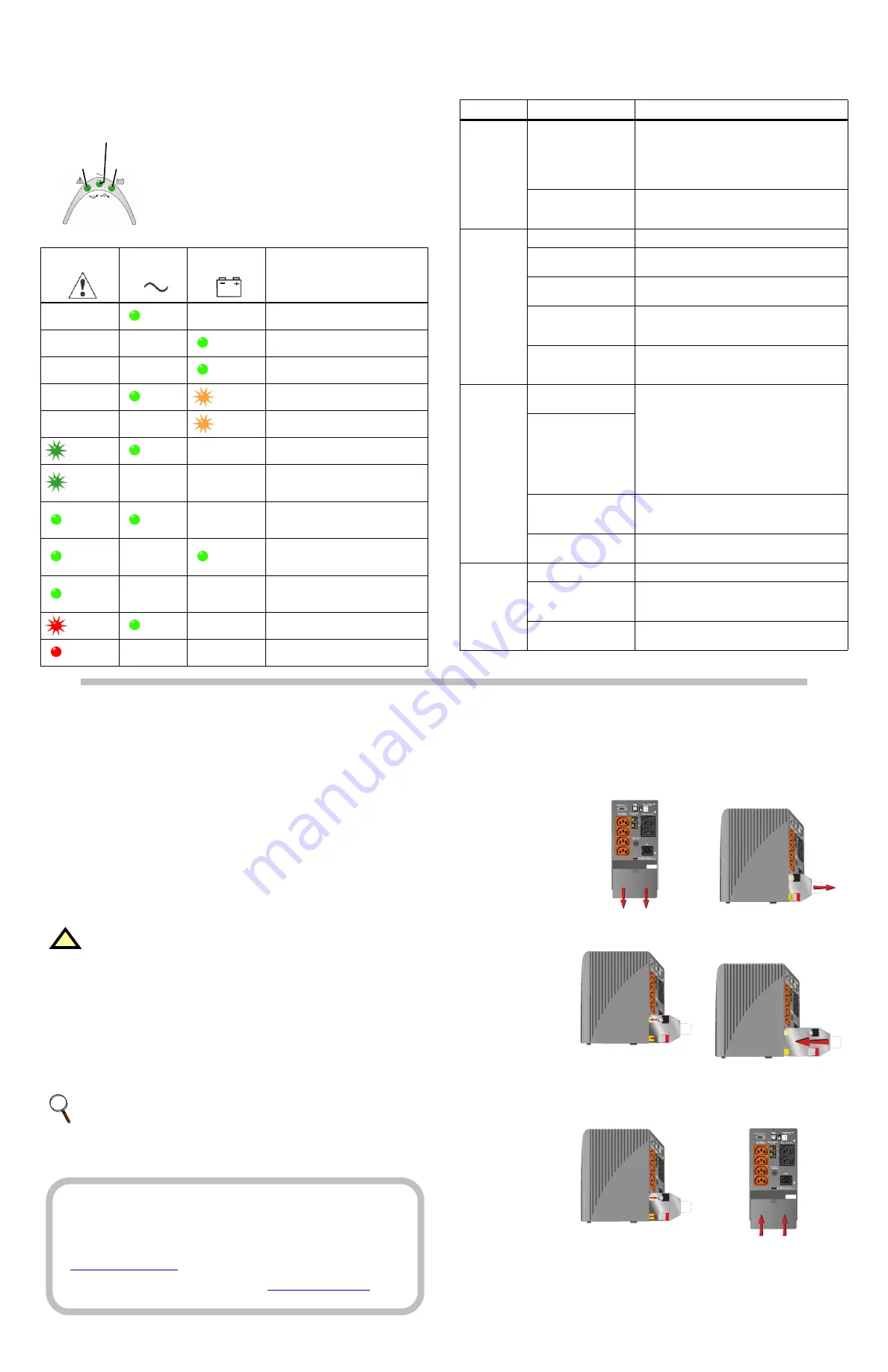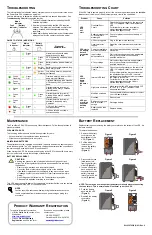
SLI-23270QS (
9
/03) Rev. 0
T
ROUBLESHOOTING
The information below indicates various symptoms a user may encounter in the event
the PowerSure PSA experiences a problem.
Use this information to determine whether external factors caused the problem. See
for suggested remedy.
GUIDE TO STATUS INDICATORS
1. The Fault indicator illuminates, indicating the UPS
detected a problem.
2. An alarm sounds, alerting that the UPS requires
attention. The alarm can be silenced except for low
battery, overload and overtemperature warning
conditions.
3. Mains and/or Battery indicators may be illuminated as
a diagnostic aid to the operator, as shown below:
Fault
Indicator
Mains
Indicator
Battery
Indicator
Diagnosis/
Audible Alarm
—
Green
ON
—
Normal operation with mains
power present; no beep.
—
—
Green
ON
UPS is operating on battery; beep
every 10 seconds.
—
—
Green
ON
Battery test has been initiated; no
beep.
—
Green
ON
Amber
Flashing
Battery needs to be replaced; long
beep every minute.
—
—
Amber
Flashing
Low battery warning; beep every
half-second.
Green
Flashing
Green
ON
—
Overload warning, load is >100%;
beep every half-second.
Green
Flashing
—
—
Overload shutdown, load exceeds
UPS capacity (110%); continuous
beep.
Green
ON
Green
ON
—
Overtemperature (overtemp)
warning; beep every 5 seconds
(Normal mode).
Green
ON
—
Green
ON
Overtemperature (overtemp)
warning; beep every 5 seconds
(Battery mode).
Green
ON
—
—
Overtemperature (overtemp)
shutdown; long beep every
5 seconds.
Red
Flashing
Green
ON
—
UPS is on, fault warning;
continuous beep.
Red
ON
—
—
UPS has failed & shut down;
continuous beep.
Fault
Indicator
Mains
Indicator
Battery
Indicator
M
AINTENANCE
The PowerSure PSA UPS requires very little maintenance. Follow these practices to
prevent problems.
CLEANING THE UPS
The following will help ensure trouble-free operation for years:
• Vacuum dust from the ventilation intake occasionally.
• Wipe the cover periodically with a dry cloth.
MAINTAINING BATTERIES
The batteries are valve-regulated, nonspillable, lead acid and must be kept charged to
retain their design life. The UPS continuously charges the batteries when connected to
the mains supply, even while the UPS is switched off.
When storing the UPS, it is recommended to plug in the UPS for at least 24 hours every
four to six months to ensure full recharge of the batteries.
BATTERY REPLACEMENT
This UPS is equipped with internal “hot swappable” batteries that the user can replace
without shutting down the UPS or connected loads.
!
CAUTION
A battery can present a risk of electrical shock and high short circuit
current. The following precautions should be observed before replacing
the batteries:
• Remove rings, watches, and other metal objects.
• Do not lay tools or other metal objects on top of the batteries.
• If the battery replacement kit is damaged in any way or shows signs
of leakage, contact your local dealer or Liebert representative imme-
diately.
• Do not dispose of batteries in a fire. The batteries may explode.
• Dispose of old batteries according to local codes.
NOTE
Caution should be exercised when replacing the batteries because the
load is unprotected from disturbances and power outages during this
procedure.
T
ROUBLESHOOTING
C
HART
If the UPS fails to operate properly, turn off the unit and repeat the steps in the
section of this manual. If the problem persists, refer to the chart below:
Problem
Cause
Solution
UPS
will
not
start
Overload/Short
Circuit
Check the circuit protector on the rear of the
UPS. If it is tripped, reset it and restart the
UPS.
For further help, call your local dealer,
Liebert representative or the Liebert
Worldwide Support Group.
Battery disconnected
or is completely
discharged
Check for proper connection of battery or
batteries.
UPS starts
on battery,
but will
not switch
to AC
UPS not plugged in
Plug in the power cord securely.
Circuit protector
tripped
Reset the circuit protector and restart the
UPS.
Power not available
at mains receptacle
Have the mains checked by a qualified
electrician.
Input voltage
below threshold
Wait until the voltage rises to an appropriate
level or have the mains checked by a
qualified electrician.
AC overvoltage
Wait until voltage lowers to an appropriate
level or have the mains checked by a
qualified electrician.
UPS
shuts
down,
Fault
Indicator
lit
Overload/Short
Circuit
Check the circuit protector on the rear of the
UPS. If it is tripped, reset it and restart the
UPS.
If the problem persists, disconnect some of
the equipment from your UPS—the total
wattage of your equipment must not exceed
the capacity of the UPS.
For further help, call your local dealer,
Liebert representative or the Liebert
Worldwide Support Group.
Internal UPS fault
High temp shutdown
Make sure that the UPS is operating in 32°F
to 104°F (0°C to 40°C) and that it has
adequate ventilation.
MultiLink shutdown
Consult the MultiLink user manual or contact
your LAN administrator.
UPS not
providing
expected
back-up
time
Overload
Reduce load.
Battery not charged
due to a recent
outage
Recharge battery.
Battery needs to be
replaced
Replace battery.
P
RODUCT
W
ARRANTY
R
EGISTRATION
To register for warranty protection:
• Visit the
Quick Links
section of our
Web site at:
• Click on
Product Warranty
Registration
and fill in the form.
If you have any questions, please
contact us at:
US: 800-222-5877
Outside the US: 614-841-6755
B
ATTERY
R
EPLACEMENT
Replacement requires removing the battery cover plate on the bottom of the UPS. No
tools are needed.
To replace the batteries:
1. Remove the battery
cover plate on the
back/bottom of the
UPS (
2. Pull the white tabs
toward you to
remove the battery
from the UPS
(
).
Figure 1
Figure 2
3. Disconnect the insu-
lated connectors
from the battery ter-
minals (
4. Insert a new battery
pack, and push the
connectors onto the
battery terminals
(black to black & red
to red) (
Figure 3
Figure 4
NOTE: There may be a small spark at the battery terminals when reconnecting
the connectors. This is normal and will not harm you or the UPS.
5. Push the battery
pack into the UPS
(
).
6. Reattach the battery
cover plate
(
).
Figure 5
Figure 6




















